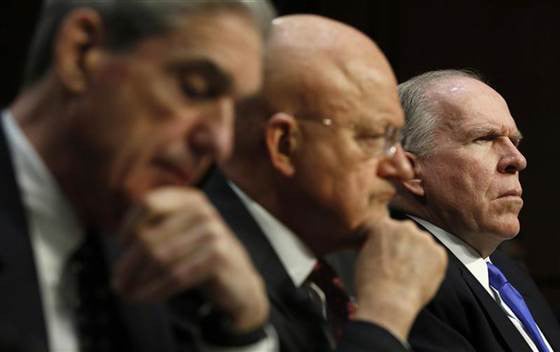US Homeland Security To Monitor More Private Civilian Web Traffic and Email
This sounds like the definition of a slippery slope: According to Reuters, the U.S. government is expanding its Internet traffic-scanning cybersecurity program to include more private sector workers, such as those at large banks, utility companies, and “key transportation” companies, and the NSA will use the Department of Homeland Security as a data-gathering middleman.
The DHS will send the data on to certain telecommunication companies and cybersecurity firms for processing; those groups will aggregate certain statistics and report back to the government, which should keep some sensitive data veiled from federal eyes. This screening and data collection will be used to hunt for cybersecurity and cyberespionage threats.

L to R: FBI Director Robert Mueller, Director of National Intelligence James Clapper, CIA Director John Brennan (Image credit: NBC News)
"That allows us to provide more sensitive information," a senior DHS official told Reuters on condition of anonymity. "We will provide the information to the security service providers that they need to perform this function." Participation for companies appears to be voluntary.
There is no doubt that cybersecurity is the most pressing threat to national security today, and the government should be applauded for pushing hard to protect the country. Companies providing cybersecurity services and those offering critical infrastructure services are doing their patriotic duty by working with the government to bolster national defense (even though doing so is in their best interests regardless).

Image credit: Reuters
However, there are some obvious and serious civil liberty issues that this program is threatening. Even if, for example, big banks opt in to the program, the bank’s customers aren’t--or they won’t realize they are because they aren’t reading the fine print. Further, there’s a huge element of “Trust Your Government” here, which generally makes most people uncomfortable: if the government is culling a certain type of data from the emails and Web traffic from its private citizens (that work for key companies), who would know if it decided to feast on other types of data?
It’s good that the NSA, DHS, and the White House say that they’re sympathetic to privacy rights, and it appears as though the program is cleverly designed to support those rights, but when the rubber meets the road in regard to the behind-the-scenes of national security, the words of politicians mean very little.
The DHS will send the data on to certain telecommunication companies and cybersecurity firms for processing; those groups will aggregate certain statistics and report back to the government, which should keep some sensitive data veiled from federal eyes. This screening and data collection will be used to hunt for cybersecurity and cyberespionage threats.

L to R: FBI Director Robert Mueller, Director of National Intelligence James Clapper, CIA Director John Brennan (Image credit: NBC News)
"That allows us to provide more sensitive information," a senior DHS official told Reuters on condition of anonymity. "We will provide the information to the security service providers that they need to perform this function." Participation for companies appears to be voluntary.
There is no doubt that cybersecurity is the most pressing threat to national security today, and the government should be applauded for pushing hard to protect the country. Companies providing cybersecurity services and those offering critical infrastructure services are doing their patriotic duty by working with the government to bolster national defense (even though doing so is in their best interests regardless).

Image credit: Reuters
However, there are some obvious and serious civil liberty issues that this program is threatening. Even if, for example, big banks opt in to the program, the bank’s customers aren’t--or they won’t realize they are because they aren’t reading the fine print. Further, there’s a huge element of “Trust Your Government” here, which generally makes most people uncomfortable: if the government is culling a certain type of data from the emails and Web traffic from its private citizens (that work for key companies), who would know if it decided to feast on other types of data?
It’s good that the NSA, DHS, and the White House say that they’re sympathetic to privacy rights, and it appears as though the program is cleverly designed to support those rights, but when the rubber meets the road in regard to the behind-the-scenes of national security, the words of politicians mean very little.

